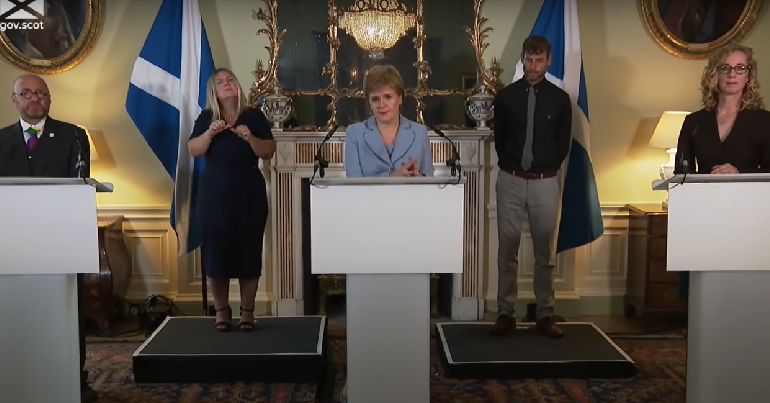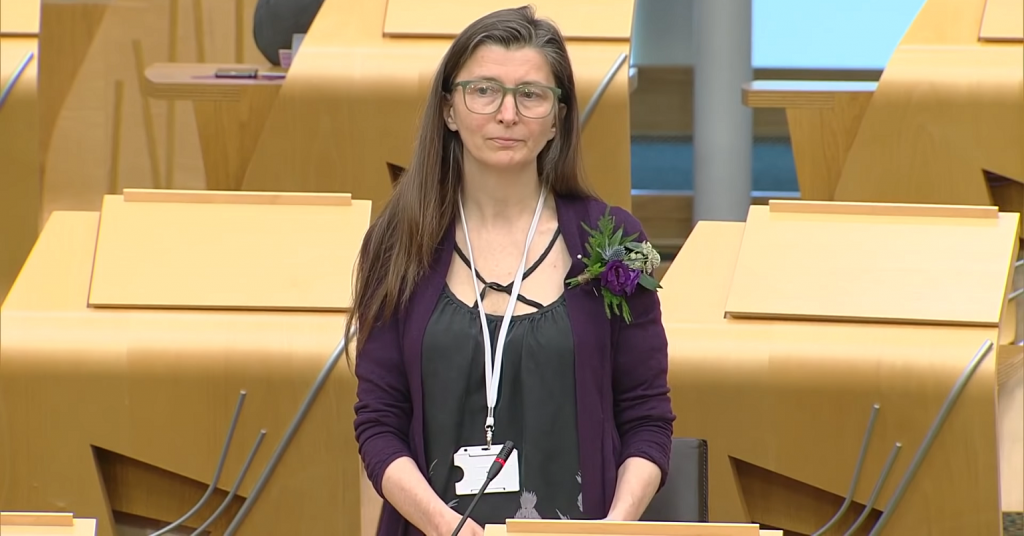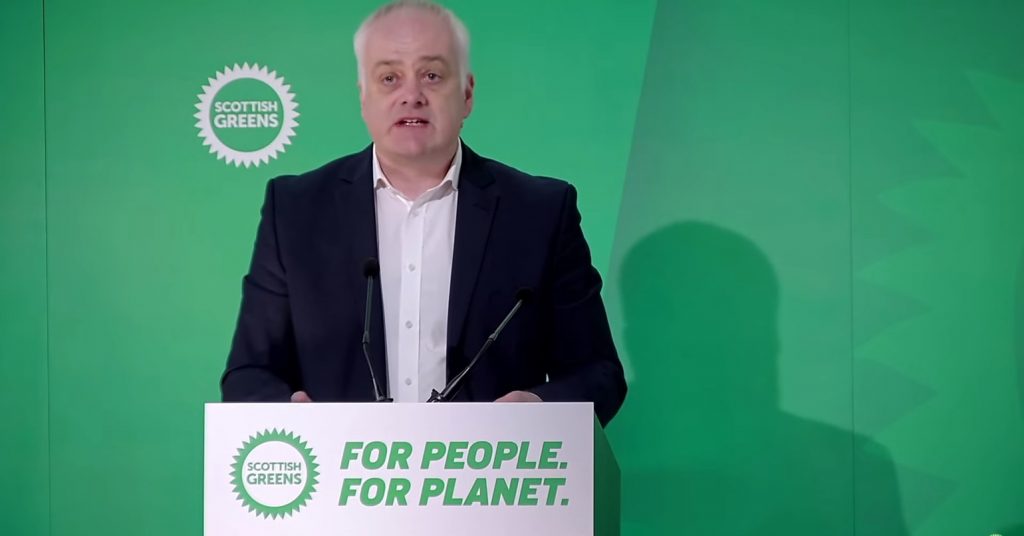Maggie Chapman elected Aberdeen University rector – speech in full
 Today Scottish Green Party co-convener Maggie Chapman was installed as Rector of the Univeristy of Aberdeen.
Today Scottish Green Party co-convener Maggie Chapman was installed as Rector of the Univeristy of Aberdeen.
This is her installation address, reposted from her blog here.
“Good morning Pro-Chancellor, Principal, ladies and gentlemen, and for those of you who organised my campaign, comrades.
I am honoured to be able to address you today, and delighted to stand before you as your rector. It is a huge privilege to have been elected by so many of you to serve you over the coming three years, and I look forward, very much, to the challenges that I hope we will face together. One challenge that it appears I must face alone, however, is the small matter of being carried around on Angus the bull. I approach that with some trepidation, but rest assured, I won’t attempt to filibuster my way through the whole of today to mean that does not happen!
I must start with some thanks. Firstly, to all those involved in organising today: Julie Beattie, Emily Beever, and many others – I am grateful for all you have done to pull this together. I am immensely grateful to the students in involved in the Shared Planet society for asking me to stand for election last year – it really was an honour to be asked. And I would not have made it to today without the cajoling, organising, campaigning, banner making, and so much more by Eva, Lina, and the rest of my campaign team. And I’d like to thank the University for being so welcoming and open, helping me find my feet around this mighty institution. And my close friends and family for their tireless support, advice and love. Huge thanks to those who have managed to travel to share today with me. Unfortunately my mother cannot be here – Zimbabwe is just too far away sometimes – but I know she is with me in thought. I am sorry that my Dad didn’t live to see today – he would have loved the robes and Angus. And finally Peter – thank you for your patient support, and for being you.
I am very much aware of the significance of the job that lies before me. I have heard so many good things about my predecessor, Maitland Mackie, and his tireless energy and enthusiasm working for students here. His are certainly big boots to fill, even if the robe didn’t need altering! I am grateful for what I have learned of this role from hearing about his good work, and also the work of Rectors at other universities.
I believe that the role of Rector is at least three fold:
Firstly, and perhaps most importantly, to be an advocate for students, ensuring that student concerns are taken seriously by all parts of the university. I hope to make a nuisance of myself in as positive and nice a way as possible to achieve this. Secondly, to participate in the governance of the university, operating not from a management perspective, but from one that is about democracy and good governance, to ensure that learning is at the heart of everything that we do, and that we resist the ever increasing pressure to become commercial graduate factories. And thirdly, to encourage the university to be much better at transforming our world for good, not just by the education we pass on to our students, but by how we use whatever resources we have to make this world better for all who live in it.
We face two great crises as a society – one that is economic, and one that is environmental.
The economic crisis is manifest in so many ways: the increase in low quality, low paid jobs, motivated by the economic elites desire to turn a quick profit; the decline in standards of living for the majority, the unaffordability of basic human needs like housing, heating, food – things that should be a right.
And the environmental crisis, driven by fossil fuel extraction, the wasteful materialism of capitalism, and the destruction of so many human and non human lives in our quest for more stuff.
And young people are bearing the brunt of these crises – for the first time, our generation (or mine and those that follow me), face a worse economic environment than our parents, with record increases in house prices, poor graduate employment, low levels of economic security, and the threat of environmental catastrophe. Young people are paying for a crisis they had no role in creating. This generation faces greater responsibility, but has less support than any post-war generation, being excluded from higher education, secure work, decent housing, by people who benefited from free education and other universal benefits, and who were not shackled by systems designed to load them with debt.
Those of us growing up after Thatcher came to power in 1979 have been subjected to a brutal attack in the form of neoliberalism, where competition and individualist success, in our school system, in housing, everywhere, are what drive society. A system designed not to develop everyone, but to support the few at the expense of the many, to discipline and punish those who do not or cannot play the game.
Our generation faces graduate unemployment of 20%, a vast reduction in the number of stable, rewarding careers available to us, the indignity and exploitation of unpaid internships. One and a half million people under 30 are unemployed. The average age of first time house buyers is 37. And that’s before you consider the long term impact of climate change and the privatisation of the NHS in England. We must continue to create a better world, not abandon what we have achieved over the past 70 years.
And while this is happening to us and our future generations, the elite get wealthier, the inequity gap gets wider and the planet gets hotter.
So, what is to be done?
We need is a just transition away from dependence on fossil fuels to clean energy systems and from an economic system that creates huge inequality to one that puts people before profit. We need to create a politics that recognises generational differences. We need a generational politics.
And this is no mean task!
We will face significant opposition and challenge, from those who are benefitting from the status quo. Already the criticism of the desire to change has started. Resistance similar to that faced by those developing a gender politics, a politics of race, or of sexuality – the important struggles that defined previous generations, but are still significant today. All of these must receive attention if we are to create a better world. And we will need to work hard to counter the voices that say it is not possible to reclaim a caring society for our and the next generations. We know from the struggles against slavery and apartheid that social change is possible.
But such change needs effort, it needs spokespeople, it needs a movement of supporters behind it. It needs a new politics. And it needs places for this new politics to thrive.
I believe that Aberdeen University can be one of these places – universities are often where social and economic change originate. By taking your enthusiasm for a better world, by drawing on your experiences of rent inequalities, dodgy landlords, poor employment prospects, you are crucial to the movement for social change. And I want to use my role as rector to support you in these aims. I hope to be able to bring this new politics to the role of Rector. To campaign on the things that matter to you, to improve the transparency and openness in our governance so you can take this out into the world beyond university. To make sure the university is in the lead in promoting sustainability and the transformation away from a fossil fuel based economy towards a green economy. Just as there needs to be replacements for the high paying jobs of the ff industry, we need to find new ways to generate energy that work for the common good. Aberdeen certainly has the potential to be a world leader for a caring, socially just and sustainable future.
I promise to work hard with you all, staff and students alike, with Emily and her team of current sabbaticals, and Genna and the new team, recently elected, to ensure our students are well prepared for this challenge ahead. I will continue to campaign against the terrible consequences of austerity, genera rational discrimination, and the demonising of the young and the poor.
Together, we can create a better world, where we can all look forward to a fulfilling future, and where we put people at the heart of everything we do.
I hope you will accept my invitation to join me in this immense task.”




Leave a Reply